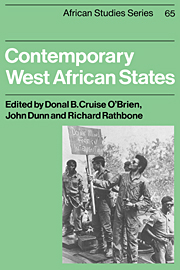6 - Ghana
The political economy of personal rule
Published online by Cambridge University Press: 10 December 2009
Summary
The facts of Ghana's agricultural and more general economic decline, from shortly after independence until 1982–3, provide an especially clear illustration of the superior explanatory power of liberal political economy, with its emphasis on mistaken government policies and interventions in the market, over neo-Marxist theory with its emphasis on imperialist exploitation. Yet it is far from clear that such liberal political economy, as presented most notably by Robert Bates, can adequately account for the really very sudden onset in 1975 of so calamitous a decline in fortunes as most Ghanaians were to experience over the next few years.
Even allowing for the distinction between short-term and long-term effects, it is a little difficult to see how the continuing adherence to economic policies which hurt nearly all urban socio-economic groups so severely in 1975–8 can be explained by the government's especial political concern and rationally conceived measures to cultivate or maintain their support. There is in fact a possible line of defence here and I will present it a little later. But, if one is to understand what happened in Ghana during this period, Bates' perspective certainly needs to be supplemented by a view of government as a highly personalist (or neo-patrimonial) machine, seeking to benefit individual favourites or networks of clients with varying degrees of concern for larger social aggregates.
- Type
- Chapter
- Information
- Contemporary West African States , pp. 75 - 98Publisher: Cambridge University PressPrint publication year: 1990
- 1
- Cited by

